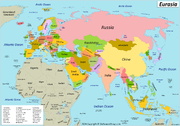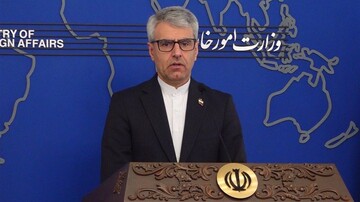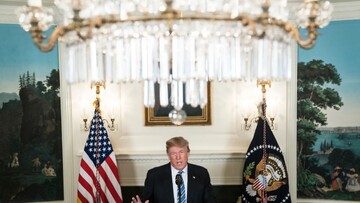-
 2026-01-05 21:50
2026-01-05 21:50
By Sheida Sabzehvari
Miscalculation by Iran's enemies could open gates of hell on them
US president and the war criminal he serves appear to have yet to learn from their failed war in June
TEHRAN – On June 13, U.S. President Donald Trump and Israeli Prime Minister Benjamin Netanyahu launched a full-scale war against Iran, beginning their military campaign by assassinating Iran's top military generals.
-

By Matin Jamshidi
The anarchy of the Trump Doctrine
Europe should wake up as Trump is knocking on the door
TEHRAN - By kidnapping Venezuelan leader Nicolás Maduro in the dead of night on January 3, under the pretext of "narco-terrorism" charges, Donald Trump and his inner circle are pushing the world toward anarchy, or more accurately, the law of the jungle.
-

By Shahrokh Saei
Trump’s imperial reach: From Latin America to Greenland
TEHRAN – U.S. President Donald Trump’s threats against other countries, issued after the abduction of Venezuelan President Nicolás Maduro in a military operation that included deadly strikes inside the Latin American nation, are not merely reckless—they are a brazen display of imperial arrogance.
-

By Sondoss Al Asaad
Lebanon between war and ‘neutralization’
BEIRUT—Lebanon is once again being asked to believe in calm—carefully worded, condition-laden calm—at a moment when pressure, not peace, defines the regional landscape.
-

By Dr. Jin Liangxiang
Iran and AsiaEuro continent: Underestimated connection and underrecognized role
SHANGHAI - The last decades have witnessed that Iran’s engagement with AsiaEuro continent has become more and more intensive, and this trend has become even more prominent since the 12-day war in 2025. Historically, Iran has always been a part of AsiaEuro continent though the connections between the two have been underestimated.
-

By Xavier Villar
Administered states, contained fortresses, legal relics
What the US war on Iran and its kidnapping of Maduro mean for world’s future
MADRID – Nicolas Maduro was not extradited. He was kidnapped. The distinction belongs not to legal semantics but to constitutive political violence.
Politics
-

Tehran warns of global fallout over US abduction of Venezuelan president
TEHRAN – Iran has reiterated its condemnation of the "utterly illegal" abduction of Venezuelan President Nicolas Maduro and his wife, Cilia Flores, by the United States, insisting that the kidnapped couple must be released immediately, demands Venezuelan authorities and its populace have also announced in recent days.
-

Iraqi officials unite in honoring Gen. Soleimani, condemning US ‘state terrorism’
TEHRAN – Iraqi Prime Minister Mohammed Shia al-Sudani has praised the "decisive and fateful" roles of the late Iranian General Qassem Soleimani and the Iraqi commander Abu Mahdi al-Muhandis, in safeguarding Iraq's security. He emphasized that the unwavering support from the Islamic Republic of Iran was fundamental to Iraq’s historic victory over the Daesh terrorist organization.
-

Trump's Iran meddling from sanctions to tweets
JAKARTA – On January 2, 2026, U.S. President Donald Trump threatened military intervention against Iran on his Truth Social platform, using the phrase "locked and loaded." This declaration of intent to interfere in a sovereign nation's internal affairs was blatant, yet it represented a familiar pattern in the history of American intervention in Iran.
Sports
-

Shakirova named Iran’s women’s basketball head coach
TEHRAN - Elen Shakirova has been officially appointed as the new head coach of Iran’s women’s national basketball team, marking a significant step for the program as it continues its upward development.
-

Igor Sergeev officially joins Persepolis
TEHRAN – Igor Sergeev, who spent last season with Pakhtakor, has officially joined Iranian giants Persepolis.
-

Iranian wrestling champions visit cancer patients
TEHRAN - World heavyweight champion Amirhossein Zare, Greco-Roman wrestling world gold medalist Ali Arsalan, and world junior Greco-Roman champion Fardin Hedayati visited cancer patients in a humanitarian initiative aimed at offering support and encouragement.
Culture
-

Two books on Palestinians’ lives published in Persian
TEHRAN – Soore Mehr Publication has released the Persian translation of two books about the life of Palestinians.
-

“Sparrow” to be released in Georgia
TEHRAN – The Iranian feature film “Sparrow” directed by Soheil Karami will be released in cinemas in Georgia from January 20.
-

“Conqueror of Khaybar” monument unveiled at Tehran’s Imam Khomeini Square
TEHRAN – Coinciding with the blessed birth anniversary of Imam Ali (AS) and the anniversary of the martyrdom of General Qassem Soleimani, a large monument titled “Conqueror of Khaybar” was unveiled at Tehran’s Imam Khomeini Square on Saturday.
Economy
-

SPGC boosts domestic production of equipment by 15% in 9 months on year
TEHRAN – Domestic production of equipment at Iran’s giant South Pars Gas Complex (SPGC) rose by more than 15 percent year on year over the first nine months of the current Iranian calendar year (late March-late December 2025), as domestic manufacturing and repair capabilities continued to expand, a senior official said.
-

Rail cargo transport up 12% as Iran accelerates shift to freight rail
TEHRAN – Iran’s rail cargo transport rose 12 percent in the first eight months of the current Iranian year (March 21-November 21, 2025), highlighting a faster shift toward rail-based freight as authorities seek to cut logistics costs, ease pressure on roads and expand export capacity.
-

Eurasia Exhibition, operational platform for implementing FTA
TEHRAN- The managing director of Tehran International Exhibitions Company reported quantitative and qualitative growth in the fourth edition of the International Eurasia Exhibition, describing the event as the most cost-effective and efficient tool for the sustainable development of regional markets and for building trust among enterprises.
Society
-

National polio vaccination campaign to target over 1m children
TEHRAN – The first phase of the national immunization campaign for polio eradication, using domestically produced vaccines, will cover a total of 1.1 million Iranian and foreign children under the age of five.
-

Comprehensive plan developed to preserve luristanica Sorbus
TEHRAN – The Department of Environment (DOE) has developed a comprehensive plan to preserve luristanica Sorbus, a rare plant species that is native to Iran and is classified as critically endangered.
-

‘Climate change, sea level rise threaten food security in southern Iran’
TEHRAN – Global warming and ice sheet melting pose serious threats to food security in the south of the country, Ahad Vazifeh, the head of the Meteorological Organization, has warned.
Tourism
-

Extension of Isfahan subway project awaits UNESCO approval
TEHRAN—The extension of Isfahan’s Metro Line 2 near the city’s UNESCO-listed Jameh Mosque, also known as the Atiq Mosque, is under review at national and international levels and will proceed only after approval from UNESCO, officials said.
-

17 foreign tour groups visit Fatima Masumeh Shrine in Qom
TEHRAN - Seventeen foreign tour groups from nine countries have paid visits to the Fatima Masumeh Shrine in the city of Qom over the past week, the shrine’s international affairs office said.
-

Turkish consul visits historical and tourism sites in Neyshabur
TEHRAN - Turkey’s consul general in Mashhad, Murad Erkul, has visited some historical and tourism sites in Neyshabur on an informal family trip, local cultural heritage officials said.
International
-

The anarchy of the Trump Doctrine
TEHRAN - By kidnapping Venezuelan leader Nicolás Maduro in the dead of night on January 3, under the pretext of "narco-terrorism" charges, Donald Trump and his inner circle are pushing the world toward anarchy, or more accurately, the law of the jungle.
-

Trump’s imperial reach: From Latin America to Greenland
TEHRAN – U.S. President Donald Trump’s threats against other countries, issued after the abduction of Venezuelan President Nicolás Maduro in a military operation that included deadly strikes inside the Latin American nation, are not merely reckless—they are a brazen display of imperial arrogance.
-

Lebanon between war and ‘neutralization’
BEIRUT—Lebanon is once again being asked to believe in calm—carefully worded, condition-laden calm—at a moment when pressure, not peace, defines the regional landscape.
Most Viewed
-
Iran is not Venezuela: Play with fire, get burned
-
Iran begins ‘targeted arrest’ of rioters
-
Miscalculation by Iran's enemies could open gates of hell on them
-
“Game Over Israel”: Red card pressure to hunt down Gaza genocide perpetrators
-
Iran moves to next stage in latest satellite missions following initial checks
-
Worldwide anger at state-run abduction
-
15240
-
Border guards foil attempted terrorist infiltration in SE Iran
-
Machado as pawn: Venezuela on Washington’s imperial chessboard
-
Venezuela thanks Iran for solidarity as Caracas vows to resist US aggression
-
Iran, Afghanistan agree to boost rail freight capacity to 100,000 tons a month
-
Kidnapping sovereignty: When law of the jungle replaces global order
-
“Conqueror of Khaybar” monument unveiled at Tehran’s Imam Khomeini Square
-
US aggression on Venezuela sparks global protests
-
Iran and AsiaEuro continent: Underestimated connection and underrecognized role












